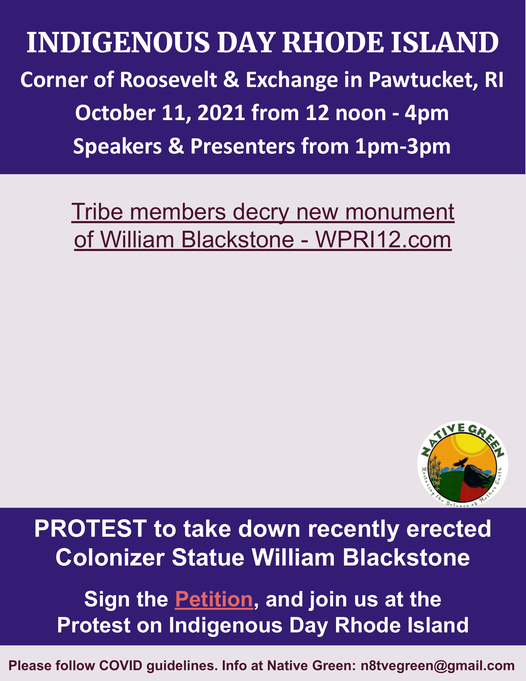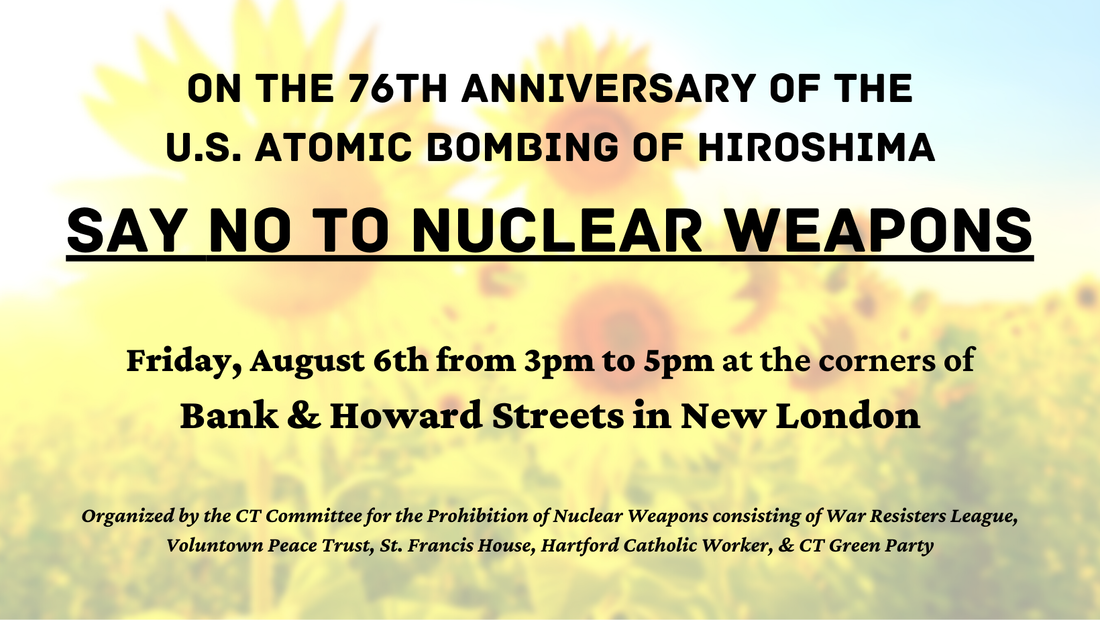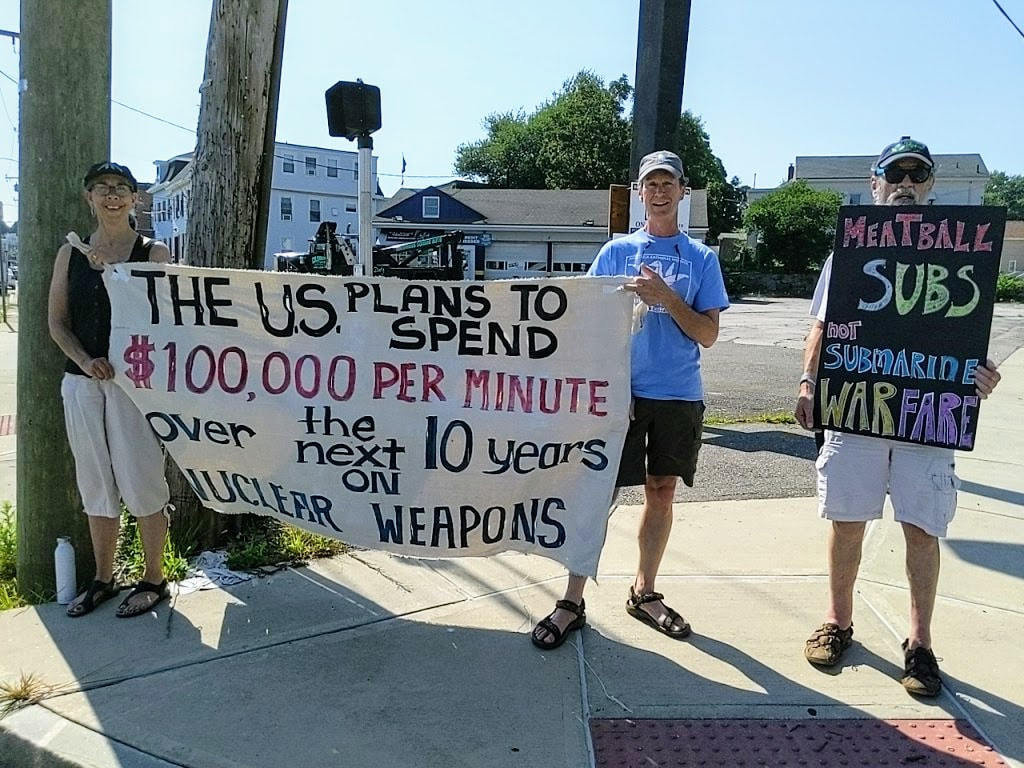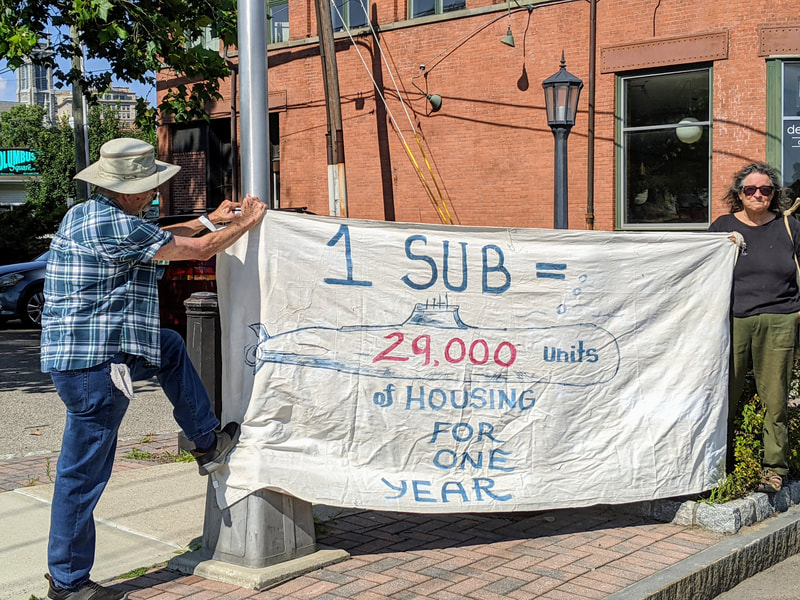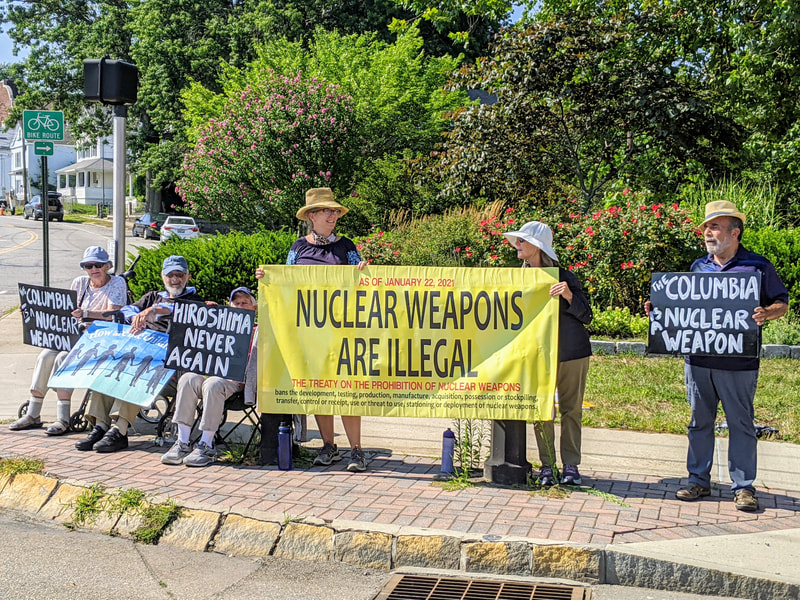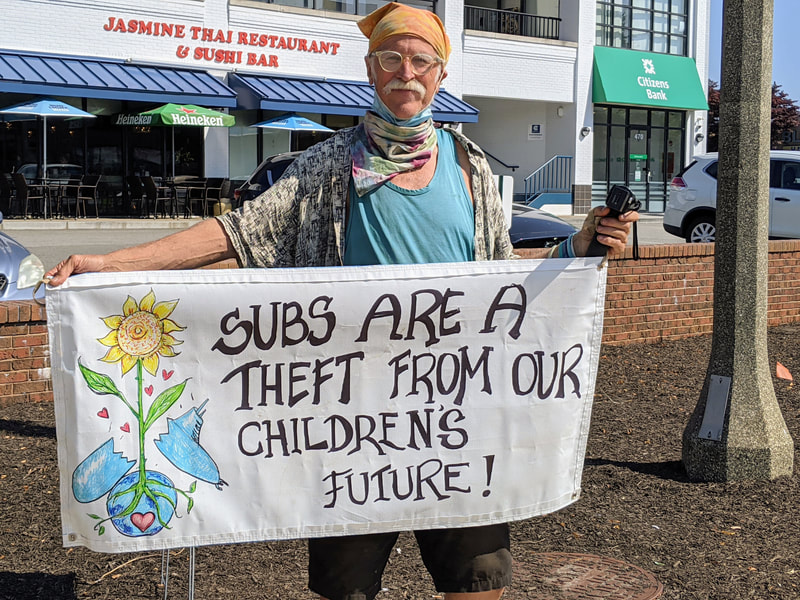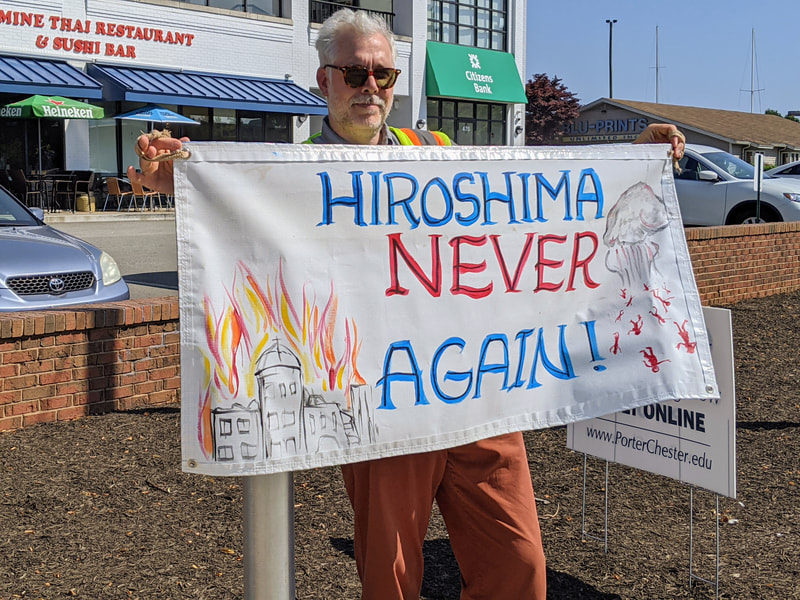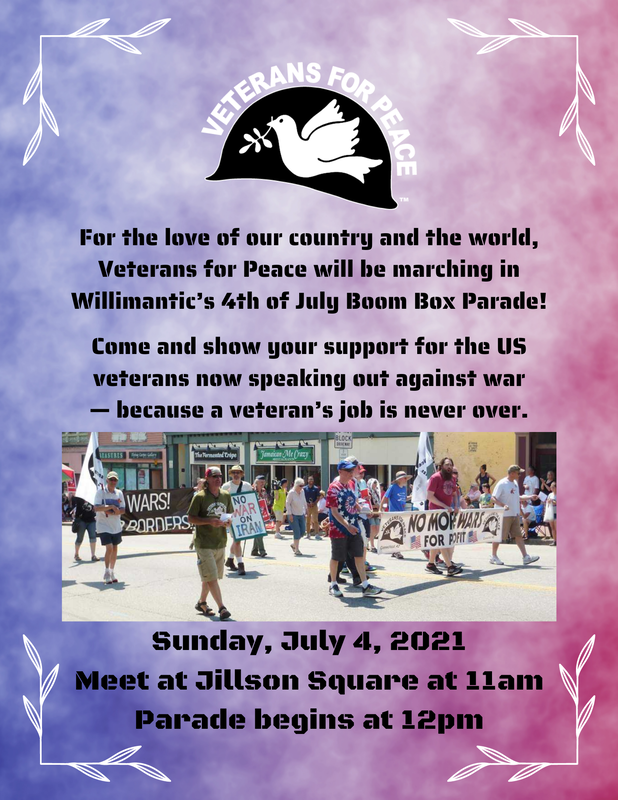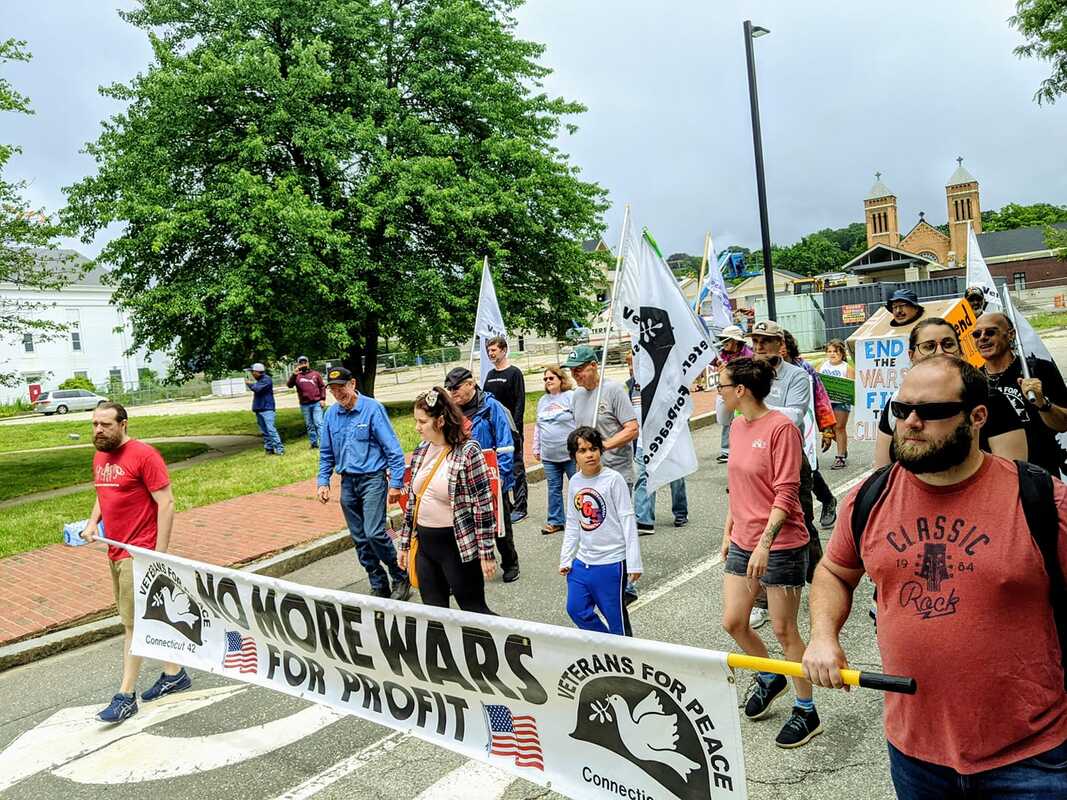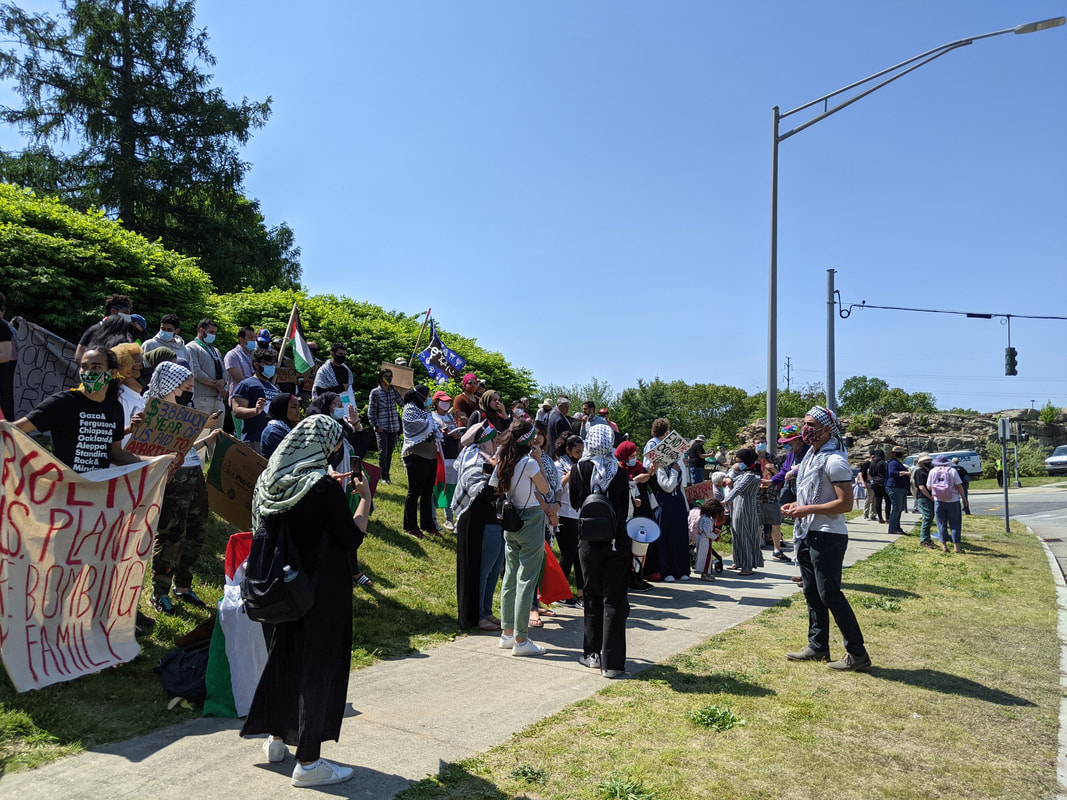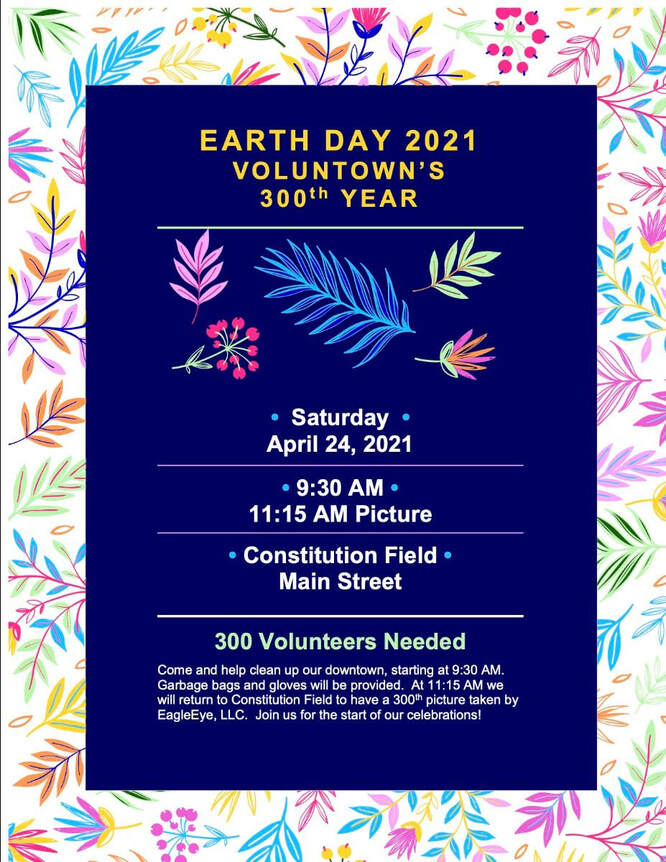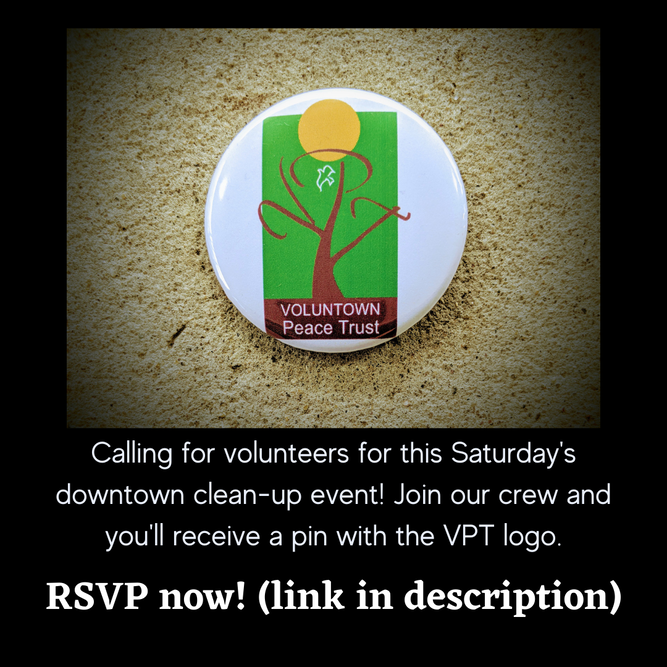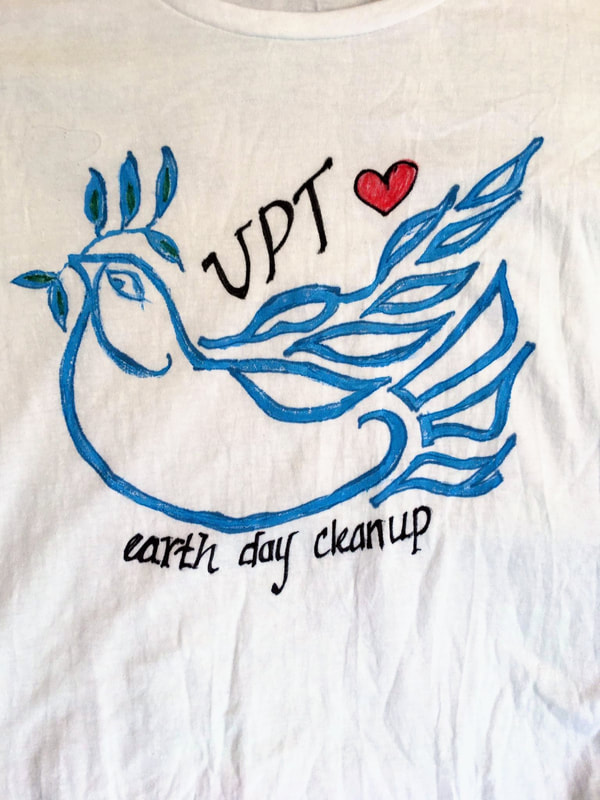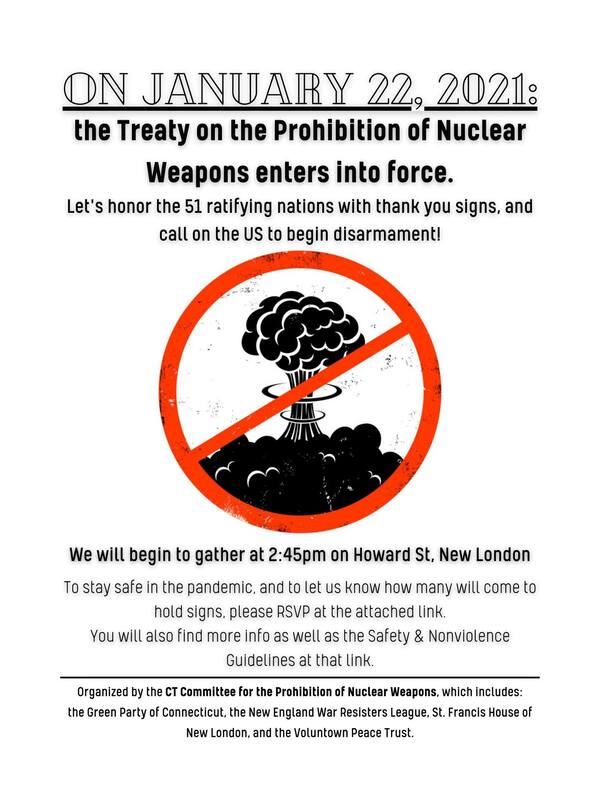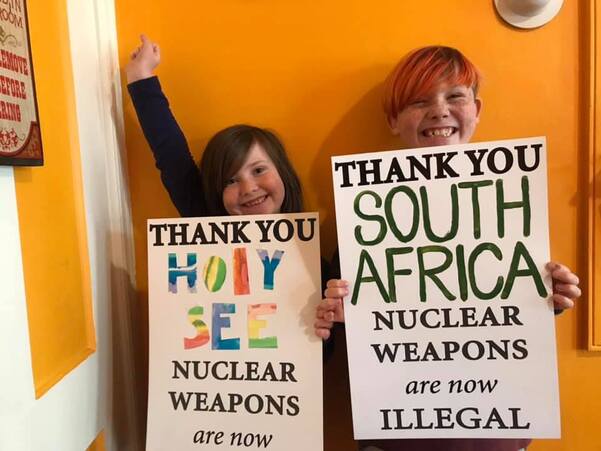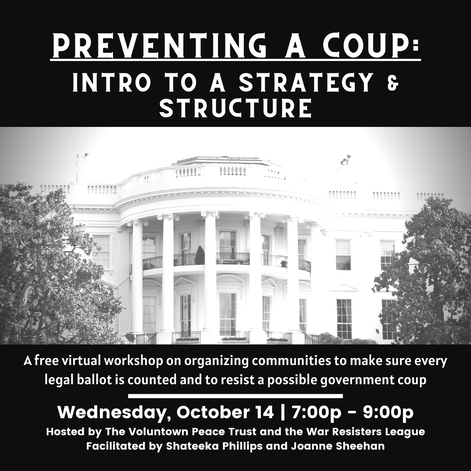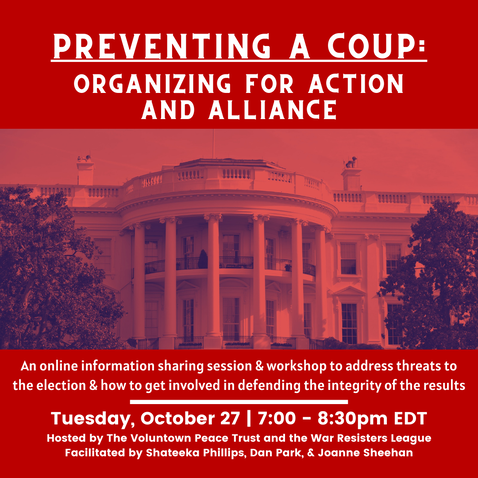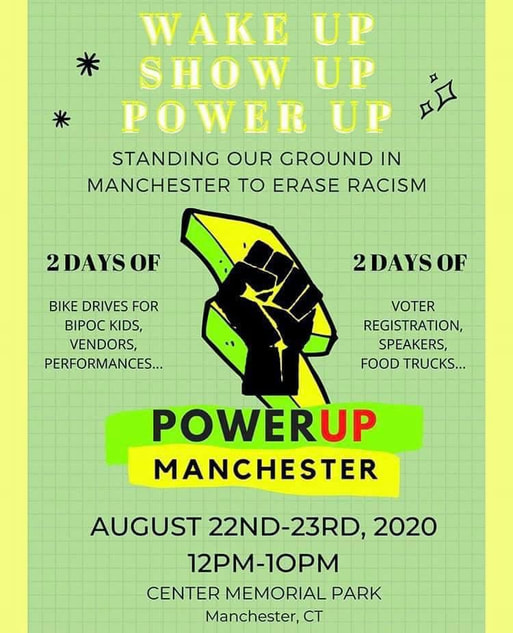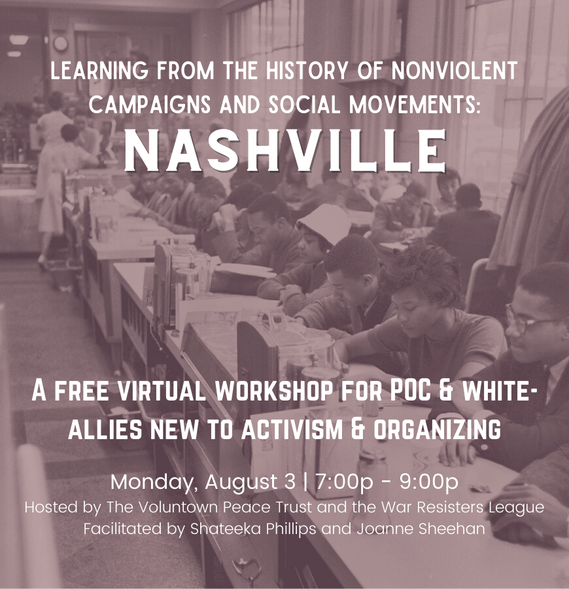October 2021
Indigenous Day Rhode Island demonstration
Monday, October 11
3:00pm - 5:00pm
Monday, October 11
3:00pm - 5:00pm
Several VPT members were involved in this demonstration, which was done to protest a new monument of the infamous colonizer William Blackstone.
Read about the issue here.
Sign the petition here.
Read about the issue here.
Sign the petition here.
August 2021
Hiroshima Day 2021 demonstration
Friday, August 6
3:00pm - 5:00pm
Friday, August 6
3:00pm - 5:00pm
From the original event description:
It was a long time ago, but it is still important. On August 6, 1945, the United States dropped a new bomb on the Japanese city of Hiroshima. It was morning, children were walking to school, workers to their jobs, the whole city was waking up. When the bomb dropped tens of thousands of people were turned to ash in an instant, people became shadows on the wall.
Here in New London, General Dynamics/Electric Boat is making so much money designing and building nuclear submarines. Each of those 12 new subs can be armed with 16 Trident D-5 submarine-launched ballistic missiles, or SLBMs, which have a range of 4,500 miles and can carry as many as 14 W-76-1 thermonuclear warheads. Each one of those warheads is six times more powerful than the atomic bomb that the U.S. military detonated over Hiroshima on August 6, 1945. Start multiplying 12 times 16 times 14 times 6 and there isn’t enough world to destroy with math like that. After all, the single Hiroshima bomb, "small" as it was, killed an estimated 140,000 people and turned the city to rubble and ash.
The best way to understand the Columbia class submarine, then, is as a $100 billion-plus initiative that aims to deliver 16,128 Hiroshimas.
We must say no to nuclear weapons. We call for abolition. We say yes to a better future.
Join us on Friday, August 6 from 3pm to 5pm at the corners of Bank & Howard Streets in New London. We will have signs and banners to share, as well as a water station in the shade nearby.
It was a long time ago, but it is still important. On August 6, 1945, the United States dropped a new bomb on the Japanese city of Hiroshima. It was morning, children were walking to school, workers to their jobs, the whole city was waking up. When the bomb dropped tens of thousands of people were turned to ash in an instant, people became shadows on the wall.
Here in New London, General Dynamics/Electric Boat is making so much money designing and building nuclear submarines. Each of those 12 new subs can be armed with 16 Trident D-5 submarine-launched ballistic missiles, or SLBMs, which have a range of 4,500 miles and can carry as many as 14 W-76-1 thermonuclear warheads. Each one of those warheads is six times more powerful than the atomic bomb that the U.S. military detonated over Hiroshima on August 6, 1945. Start multiplying 12 times 16 times 14 times 6 and there isn’t enough world to destroy with math like that. After all, the single Hiroshima bomb, "small" as it was, killed an estimated 140,000 people and turned the city to rubble and ash.
The best way to understand the Columbia class submarine, then, is as a $100 billion-plus initiative that aims to deliver 16,128 Hiroshimas.
We must say no to nuclear weapons. We call for abolition. We say yes to a better future.
Join us on Friday, August 6 from 3pm to 5pm at the corners of Bank & Howard Streets in New London. We will have signs and banners to share, as well as a water station in the shade nearby.
July 2021
Willimantic's 4th of July Boom Box Parade with Veterans for Peace Chapter 42
Sunday, July 4
11:00am - 1:00pm
Sunday, July 4
11:00am - 1:00pm
From the original event description:
Two years ago on the 4th of July, the Veterans for Peace Chapter 42 marched in Willimantic's Boom Box Parade with large antiwar banners, calling out military-style cadences with antiwar messages. About 15-20 people marched with them, and they received positive reactions from the crowd. This year, they want to do it again, but with more folks joining them!
The parade starts at Jillson Square and ends at Memorial Park. Participants of the Veterans for Peace portion are invited back to the Hosmer Mountain Beverages Store at 217 Mountain Street after the parade for complimentary sandwiches and craft sodas. And if you have a boombox and/or a playlist of good antiwar songs, bring it!
Two years ago on the 4th of July, the Veterans for Peace Chapter 42 marched in Willimantic's Boom Box Parade with large antiwar banners, calling out military-style cadences with antiwar messages. About 15-20 people marched with them, and they received positive reactions from the crowd. This year, they want to do it again, but with more folks joining them!
The parade starts at Jillson Square and ends at Memorial Park. Participants of the Veterans for Peace portion are invited back to the Hosmer Mountain Beverages Store at 217 Mountain Street after the parade for complimentary sandwiches and craft sodas. And if you have a boombox and/or a playlist of good antiwar songs, bring it!
May 2021
Cut Military Spending & Rebuild Local Communities: Biden at the Coast Guard demonstration
Wednesday, May 19
9:30a - 11:30a (EDT)
Wednesday, May 19
9:30a - 11:30a (EDT)
See The Day newspaper article on the event here
From the afternoon after the event:
About 130 people came out to New London this morning, including folks from New Haven and as far away as Bridgeport! We gathered to remind Biden that American tax dollars, American technology, and American foreign policy not only permit but encourage and materially support foreign violent atrocities -- especially Israeli state violence in Gaza. After decades of directly fueling the ongoing genocidal campaign perpetrated on Palestinians, it's time for us as a nation to turn around and correct those mistakes.
From the afternoon after the event:
About 130 people came out to New London this morning, including folks from New Haven and as far away as Bridgeport! We gathered to remind Biden that American tax dollars, American technology, and American foreign policy not only permit but encourage and materially support foreign violent atrocities -- especially Israeli state violence in Gaza. After decades of directly fueling the ongoing genocidal campaign perpetrated on Palestinians, it's time for us as a nation to turn around and correct those mistakes.
April 2021
Voluntown Tricentennial Earth Day 2021: Downtown Cleanup
Saturday, April 24
9:00a - 11:15a (EDT)
Saturday, April 24
9:00a - 11:15a (EDT)
From the original event description:
Voluntown is kicking off its tricentennial anniversary this year with an Earth Day downtown clean-up event! As members of the Voluntown community since 1962, VPT is seeking volunteers to participate in the town's celebration of Earth Day this year.
Folks who join the VPT clean-up team will receive a large VPT pin-button. Let's show our neighbors what it means to be a part of a community. Come join us on the morning of April 24 to help clear the downtown of litter!
Meet at VPT between 9:00am and 9:25am to receive a button identifying you as a VPT volunteer. If you arrive a little late, just go straight to Constitution Park and look for volunteers with the VPT buttons. Garbage bags and gloves will also be provided. Save the date!
So that we know how many volunteers to expect, please RSVP by signing up at the link: https://www.signupgenius.com/.../10c0c4da4a622abf8c43....
You may also RSVP by giving us a call at 860-376-9970 or emailing us at voluntownpeacetrust@gmail.com.
Voluntown is kicking off its tricentennial anniversary this year with an Earth Day downtown clean-up event! As members of the Voluntown community since 1962, VPT is seeking volunteers to participate in the town's celebration of Earth Day this year.
Folks who join the VPT clean-up team will receive a large VPT pin-button. Let's show our neighbors what it means to be a part of a community. Come join us on the morning of April 24 to help clear the downtown of litter!
Meet at VPT between 9:00am and 9:25am to receive a button identifying you as a VPT volunteer. If you arrive a little late, just go straight to Constitution Park and look for volunteers with the VPT buttons. Garbage bags and gloves will also be provided. Save the date!
So that we know how many volunteers to expect, please RSVP by signing up at the link: https://www.signupgenius.com/.../10c0c4da4a622abf8c43....
You may also RSVP by giving us a call at 860-376-9970 or emailing us at voluntownpeacetrust@gmail.com.
January 2021
Treaty on the Prohibition of Nuclear Weapons enters force -- demonstration
Friday, January 22
2:45p - 4:00p (EDT)
Friday, January 22
2:45p - 4:00p (EDT)
See The Day newspaper article on the event here
From the original event description:
On January 22, 2021, people around the world will celebrate the day that the Treaty on the Prohibition of Nuclear Weapons (TPNW) enters into force, which the International Campaign to Abolish Nuclear Weapons (ICANW) describes so eloquently as “the beginning of the end of nuclear weapons.” Fifty-one states have already ratified it. We call on the United States to sign the Treaty.
On Friday, January 22 from 2:45-4pm, we invite you to gather along Howard Street holding a sign thanking each of the 51 nations that have ratified the Treaty Prohibiting Nuclear Weapons. We will provide the signs. We will stand along this public street along the route driven by General Dynamics Electric Boat employees leaving the work on Pequot Avenue. Our goal is to honor the hard work of the treaty ratifiers and to call on the United States, the largest nuclear weapons state, to begin the process of disarmament.
Cars may be parked on side streets along Howard or at the far end of Shaw's Cove.
To stay safe in the pandemic, and to know how many are coming to hold the 51 signs plus a banner, we are asking participants to RSVP and agree to the Safety & Nonviolence Guidelines using this brief form.
From the original event description:
On January 22, 2021, people around the world will celebrate the day that the Treaty on the Prohibition of Nuclear Weapons (TPNW) enters into force, which the International Campaign to Abolish Nuclear Weapons (ICANW) describes so eloquently as “the beginning of the end of nuclear weapons.” Fifty-one states have already ratified it. We call on the United States to sign the Treaty.
On Friday, January 22 from 2:45-4pm, we invite you to gather along Howard Street holding a sign thanking each of the 51 nations that have ratified the Treaty Prohibiting Nuclear Weapons. We will provide the signs. We will stand along this public street along the route driven by General Dynamics Electric Boat employees leaving the work on Pequot Avenue. Our goal is to honor the hard work of the treaty ratifiers and to call on the United States, the largest nuclear weapons state, to begin the process of disarmament.
Cars may be parked on side streets along Howard or at the far end of Shaw's Cove.
To stay safe in the pandemic, and to know how many are coming to hold the 51 signs plus a banner, we are asking participants to RSVP and agree to the Safety & Nonviolence Guidelines using this brief form.
October 2020
Preventing a Coup: Intro to a Strategy & Structure
Wednesday, October 14
7:00p - 9:00p (EDT)
Wednesday, October 14
7:00p - 9:00p (EDT)
As we prepared to run another round of online workshops for the fall, we learned of a growing national movement to defend the integrity of the US election from threats of disruption, voter intimidation, and other forms of voter suppression to which President Trump and other prominent Republicans had previously alluded. We decided to modify our plans and give two new workshops specific to the issues of voter intimidation and political power-grabs. Participants were briefed on the situation, the potential threats and scenarios, and the various national groups providing trainings and organizing to prevent those threats. We also prepared a resource document of the groups and resources around the country and locally in Connecticut to join.
From the original workshop description:
'Groups across the country are organizing in case of a power-grab and a constitutional crisis. This workshop will share resources and strategies being coordinated by these groups, and will teach participants how to organize their own communities to actively resist and prevent an illegitimate, undemocratic government takeover.'
From the original workshop description:
'Groups across the country are organizing in case of a power-grab and a constitutional crisis. This workshop will share resources and strategies being coordinated by these groups, and will teach participants how to organize their own communities to actively resist and prevent an illegitimate, undemocratic government takeover.'
Preventing a Coup: Organizing for Action and Alliance
Election Integrity Information Sharing Session & Workshop
Monday, October 26
7:00-8:30pm EDT
Election Integrity Information Sharing Session & Workshop
Monday, October 26
7:00-8:30pm EDT
The second workshop in October was similar to the first, but streamlined and with more urgency. We also shared deescalation techniques that we had recently learned from the national workshops.
From the original workshop description:
'Last week, Connecticut State Republican Party chairman J.R. Romano sent out a call for an “Army for Trump” to become poll-watchers to “ensure a fair and honest election.” Within the context of President Trump's encouragement of violent white supremacist groups like the Proud Boys, the call sounds like one for voter intimidation.
This 1.5 hour info sharing session & workshop will address the threats to the election, and how to get involved in defending the integrity of the results. Topics will include: analyses of election scenarios and responses, examples of thwarted coups; workshop on de-escalation, staying safe, nonviolent resistance; national resources and trainings; and local efforts for central and eastern Connecticut.'
From the original workshop description:
'Last week, Connecticut State Republican Party chairman J.R. Romano sent out a call for an “Army for Trump” to become poll-watchers to “ensure a fair and honest election.” Within the context of President Trump's encouragement of violent white supremacist groups like the Proud Boys, the call sounds like one for voter intimidation.
This 1.5 hour info sharing session & workshop will address the threats to the election, and how to get involved in defending the integrity of the results. Topics will include: analyses of election scenarios and responses, examples of thwarted coups; workshop on de-escalation, staying safe, nonviolent resistance; national resources and trainings; and local efforts for central and eastern Connecticut.'
August 2020
Sunday, August 23
4:30-5:30 PM EST
"Stories and Strategies from the Civil Rights Movement"
A mini-workshop at POWER UP - Manchester's Wake Up, Show Up, Power Up weekend event
4:30-5:30 PM EST
"Stories and Strategies from the Civil Rights Movement"
A mini-workshop at POWER UP - Manchester's Wake Up, Show Up, Power Up weekend event
Joanne Sheehan was invited to run an hour long workshop at the Power Up! event that included voter registration and a collection fo bikes for kids at Center Memorial Park. Vendors, community allies, and other speakers ajoined. In this workshop, Joanne asked participants about what they knew about the Civil Rights Movement, then briefly gave an overview of the nonvilent campaigns. Joanne explained what actions, campaigns, and movements are, how they interact with each other, and examples of both successful and unsuccessful ones. Joanne and Dan Park also had a literature table with Black Lives Matter materials, along with materials from War Resisters League and VPT. Several participants came by to talk and learn more.
Monday, August 3
7:00-9:00 PM EST
"Learning from the History of Nonviolent Campaigns and Social Movements: Nashville"
A free virtual workshop for POC & white-allies new to activism & organizin
7:00-9:00 PM EST
"Learning from the History of Nonviolent Campaigns and Social Movements: Nashville"
A free virtual workshop for POC & white-allies new to activism & organizin
This was our first online workshop, and with the exception of a few technical hiccups, went well. In this workshop, the participants explored one of the most foundational campaigns in the Civil Rights Movement, where John Lewis and many others learned about strategic nonviolent campaigns in 1960: the Nashville Campaign. After introductions, workshop participants watched a 25 minute documentary on the Nashville Campaign, followed by an open discussion. Participants together mapped out and strategically analyzed the situation through the use of an organizing chart. A dozen participants attended this online workshop, with Joanne Sheehan and Shateeka Phillips as the facilitators and Dan Park as the moderator.
April - May 2020
Nonviolent Social Change in the time of COVID-19
Personal Resilience, Resistance and Constructive Program
A six-week discussion series beginning April 17, 2020, 7:00-8:30 EST.
Sponsored by the Voluntown Peace Trust,
New England War Resisters League, and St. Francis House.
Coordinated by Joanne Sheehan.
Sponsored by the Voluntown Peace Trust,
New England War Resisters League, and St. Francis House.
Coordinated by Joanne Sheehan.
In this time of social distance and quarantines, some of us are left wondering what we should be doing in this unprecedented situation. Many of us miss participating in the world, and yearn to connect with each other. And still others are seeking out ways to make the best use of this time, to be prepared for the new world whenever this crisis comes to an end.
Normally, the Voluntown Peace Trust would host an event to raise spirits and bring the community together, but the rise of COVID-19 obviously prevents us from doing that now. Instead, in conjunction with St. Frances House and the New England War Resisters League, we have decided to host a weekly online discussion series for the next month and a half.
Normally, the Voluntown Peace Trust would host an event to raise spirits and bring the community together, but the rise of COVID-19 obviously prevents us from doing that now. Instead, in conjunction with St. Frances House and the New England War Resisters League, we have decided to host a weekly online discussion series for the next month and a half.
We will be using the same Zoom numbers for all the May sessions.
The Zoom call will be open starting at 6:45. Please join by 6:55 so we can start promptly at 7pm. Call 860-437-0394 if you are having trouble connecting.
Join the Zoom Meeting by clicking here.
Or, you can manually log in to the meeting with the following information
Meeting ID: 858 4959 2313
Password: 151041
To phone into the meeting without video, find your local number by clicking here.
The Zoom call will be open starting at 6:45. Please join by 6:55 so we can start promptly at 7pm. Call 860-437-0394 if you are having trouble connecting.
Join the Zoom Meeting by clicking here.
Or, you can manually log in to the meeting with the following information
Meeting ID: 858 4959 2313
Password: 151041
To phone into the meeting without video, find your local number by clicking here.
Friday, May 22
7:00-8:30 PM EST
"Community Economics"
Economic relationships are positive or negative, just or unjust, nonviolent or destructive. Nonviolent economics are community economics. William Spademan of Common Good and Eric Bachman of Time Banks will describe the community economics projects they are involved in.
You are encouraged to read about the projects in advance as well as “Toward a Nonviolent Economics” by Joanne Sheehan and Chuck Matthei here.
7:00-8:30 PM EST
"Community Economics"
Economic relationships are positive or negative, just or unjust, nonviolent or destructive. Nonviolent economics are community economics. William Spademan of Common Good and Eric Bachman of Time Banks will describe the community economics projects they are involved in.
You are encouraged to read about the projects in advance as well as “Toward a Nonviolent Economics” by Joanne Sheehan and Chuck Matthei here.
Friday May 15
7:00– 8:30pm
"Principled Practical Programs"
Some are drawn to constructive programs because they are rooted in principles including community control, economic justice, equality, emancipation, nonviolence and ecological sustainability. Some are drawn to constructive programs because they fulfill a need - affordable housing, food, health care, a job, etc. We come to this work through different paths, but if it is going to work, we all need to play a role.
Joanne Sheehan will use a combination interviews and storytelling to explore what we can learn from constructive program efforts and explore what is needed and emerging beyond COVID?
7:00– 8:30pm
"Principled Practical Programs"
Some are drawn to constructive programs because they are rooted in principles including community control, economic justice, equality, emancipation, nonviolence and ecological sustainability. Some are drawn to constructive programs because they fulfill a need - affordable housing, food, health care, a job, etc. We come to this work through different paths, but if it is going to work, we all need to play a role.
Joanne Sheehan will use a combination interviews and storytelling to explore what we can learn from constructive program efforts and explore what is needed and emerging beyond COVID?
Friday May 8
7:00– 8:30pm
"How Can We Be Effective?"
Gandhi believed that the strategic combination of a personal commitment to improving our ways of living and our resilience, the practice of various forms of nonviolent action against social injustices, and constructive work are all needed for nonviolent social change. Joanne Sheehan will use a combination of storytelling and interviews to explore what we can learn from how nonviolent social change has happened and how we can use this to deal with the time of COVID and beyond.
The discussion on Friday, May 8 will be Session 4 of a six-session series. We will continue to explore this in Sessions 5 & 6, focusing on constructive work/solidarity economics/just transitions that reorganize social, economic and political life.
We will be using the same Zoom numbers for all the May sessions.
Join the Zoom Meeting by clicking here.
Meeting ID: 858 4959 2313
Password: 151041
Or dial-in by phone. Find your local number by clicking here.
7:00– 8:30pm
"How Can We Be Effective?"
Gandhi believed that the strategic combination of a personal commitment to improving our ways of living and our resilience, the practice of various forms of nonviolent action against social injustices, and constructive work are all needed for nonviolent social change. Joanne Sheehan will use a combination of storytelling and interviews to explore what we can learn from how nonviolent social change has happened and how we can use this to deal with the time of COVID and beyond.
The discussion on Friday, May 8 will be Session 4 of a six-session series. We will continue to explore this in Sessions 5 & 6, focusing on constructive work/solidarity economics/just transitions that reorganize social, economic and political life.
We will be using the same Zoom numbers for all the May sessions.
Join the Zoom Meeting by clicking here.
Meeting ID: 858 4959 2313
Password: 151041
Or dial-in by phone. Find your local number by clicking here.
Wednesday April 29
7:00– 8:30pm
"Warheads to Windmills: The Nuclear Ban Treaty and the Green New Deal"
A Webinar
featuring Timmon Wallis, PhD of NuclearBan.US
and US Representative Jim McGovern
Amid extreme threat and great loss come an opportunity to construct a path toward a more sustainable and harmonious future. An initiative of NuclearBan.US, Timmon Wallis explains what it will take to adequately address the climate crisis and where the needed funds and scientific and engineering expertise could come from: the nuclear weapons program. "These weapons threaten our very existence as a species. And so does the climate crisis. But if we eliminate nuclear weapons, we can convert an industry of death to an industry of life. We can shift massive amounts of money and scientific talent to green technologies we need to survive -- and we can create millions of jobs." - Timmon Wallis
Organized by: The Center for Nonviolent Solutions, Worcester, MA
Co-sponsored by: New England War Resisters League, St. Francis House, Voluntown Peace Trust, Central Mass 350.org, Mothers Out Front, Regional Environmental Council, Mass Peace Action "Warheads to Windmills" will be hosted over Zoom.
Register in advance for this webinar here. After registering, you will receive a confirmation email containing information about joining the webinar.
If you do not possess a smartphone, desktop computer, or other device that can run Zoom, or you simply wish to phone into the meeting rather than be part of the video, click here to find the phone number for your country and dial in by phone.
7:00– 8:30pm
"Warheads to Windmills: The Nuclear Ban Treaty and the Green New Deal"
A Webinar
featuring Timmon Wallis, PhD of NuclearBan.US
and US Representative Jim McGovern
Amid extreme threat and great loss come an opportunity to construct a path toward a more sustainable and harmonious future. An initiative of NuclearBan.US, Timmon Wallis explains what it will take to adequately address the climate crisis and where the needed funds and scientific and engineering expertise could come from: the nuclear weapons program. "These weapons threaten our very existence as a species. And so does the climate crisis. But if we eliminate nuclear weapons, we can convert an industry of death to an industry of life. We can shift massive amounts of money and scientific talent to green technologies we need to survive -- and we can create millions of jobs." - Timmon Wallis
Organized by: The Center for Nonviolent Solutions, Worcester, MA
Co-sponsored by: New England War Resisters League, St. Francis House, Voluntown Peace Trust, Central Mass 350.org, Mothers Out Front, Regional Environmental Council, Mass Peace Action "Warheads to Windmills" will be hosted over Zoom.
Register in advance for this webinar here. After registering, you will receive a confirmation email containing information about joining the webinar.
If you do not possess a smartphone, desktop computer, or other device that can run Zoom, or you simply wish to phone into the meeting rather than be part of the video, click here to find the phone number for your country and dial in by phone.
Friday, APRIL 24
7:00– 8:30pm
"Personal Resilience"
with reflections from Deacon Ellen Adams, Dan Park and Anne Scheibner
How do we take care of ourselves in a time of such anxiety? Even in the best of times we need personal practices that sustain us. Overwhelming illness and death has created a crisis resulting in fear and despair, the potential loss of a sense of purpose for ourselves and our community. Some of us are working too much, some are emotionally paralyzed by fear and lost in the isolation. We cannot collectively make this a healthier world if we are not also working to make ourselves healthier. And yet, we must also be wary of becoming too self-oriented, lest we detach ourselves from the world altogether. How can we use this time to increase our personal resilience and sense of empowerment while still staying engaged with our communities?
Please have paper and pen ready for a short exercise.
"Personal Resilience" will be hosted over Zoom.
You do not need to have a Zoom account to be part of this gathering.
Click here to join Zoom Meeting
Meeting ID: 935 1323 9324
Password: 079600
If you do not possess a smartphone, desktop computer, or other device that can run Zoom, or you simply wish to phone into the meeting rather than be part of the video, click here to find the phone number for your country and dial in by phone.
7:00– 8:30pm
"Personal Resilience"
with reflections from Deacon Ellen Adams, Dan Park and Anne Scheibner
How do we take care of ourselves in a time of such anxiety? Even in the best of times we need personal practices that sustain us. Overwhelming illness and death has created a crisis resulting in fear and despair, the potential loss of a sense of purpose for ourselves and our community. Some of us are working too much, some are emotionally paralyzed by fear and lost in the isolation. We cannot collectively make this a healthier world if we are not also working to make ourselves healthier. And yet, we must also be wary of becoming too self-oriented, lest we detach ourselves from the world altogether. How can we use this time to increase our personal resilience and sense of empowerment while still staying engaged with our communities?
Please have paper and pen ready for a short exercise.
"Personal Resilience" will be hosted over Zoom.
You do not need to have a Zoom account to be part of this gathering.
Click here to join Zoom Meeting
Meeting ID: 935 1323 9324
Password: 079600
If you do not possess a smartphone, desktop computer, or other device that can run Zoom, or you simply wish to phone into the meeting rather than be part of the video, click here to find the phone number for your country and dial in by phone.
Friday, April 17
7:00– 8:30pm
"Beyond COVID-19"
On Saturday, April 4th, people gathered for the annual St. Francis House reading (by Zoom) of Rev. Dr. Martin Luther King, Jr.'s Declaration of Independence from the War in Vietnam which he delivered on April 4, 1967, one year before he assassinated. We noticed how King spoke of the creation of a new world, calling repeatedly for “a true revolution of values,” inspiring the theme of this first session.
What do we find in MLK’s “Beyond Vietnam” speech that inspires us for today’s challenges? Dr. King spoke of the “struggle for a new world,” recognizing that “machines and computers, profit motives and property rights are considered more important than people.” He believed that, “Our only hope today lies in our ability to recapture the revolutionary spirit and go out into a sometimes hostile world declaring eternal hostility to poverty, racism and militarism.” COVID-19 has made the need for us to seriously take up that call even more crucial. Joanne Sheehan will present and lead a discussion which will include members of the St. Francis House Community discussing how their Ten Principles, which are universal, speak to a “true revolution of values”.
To listen to Dr. King’s April 4, 1967 address with text, visit the link here.
To see the Ten Principles, visit the link here.
7:00– 8:30pm
"Beyond COVID-19"
On Saturday, April 4th, people gathered for the annual St. Francis House reading (by Zoom) of Rev. Dr. Martin Luther King, Jr.'s Declaration of Independence from the War in Vietnam which he delivered on April 4, 1967, one year before he assassinated. We noticed how King spoke of the creation of a new world, calling repeatedly for “a true revolution of values,” inspiring the theme of this first session.
What do we find in MLK’s “Beyond Vietnam” speech that inspires us for today’s challenges? Dr. King spoke of the “struggle for a new world,” recognizing that “machines and computers, profit motives and property rights are considered more important than people.” He believed that, “Our only hope today lies in our ability to recapture the revolutionary spirit and go out into a sometimes hostile world declaring eternal hostility to poverty, racism and militarism.” COVID-19 has made the need for us to seriously take up that call even more crucial. Joanne Sheehan will present and lead a discussion which will include members of the St. Francis House Community discussing how their Ten Principles, which are universal, speak to a “true revolution of values”.
To listen to Dr. King’s April 4, 1967 address with text, visit the link here.
To see the Ten Principles, visit the link here.
GANDHI’S THREE ELEMENTS OF NONVIOLENT SOCIAL CHANGE
A comprehensive program of nonviolent social change was viewed by Gandhi as having three main aspects. These three elements inform and guide this discussion series, as well as the other VPT activities:
A comprehensive program of nonviolent social change was viewed by Gandhi as having three main aspects. These three elements inform and guide this discussion series, as well as the other VPT activities:
- Personal Resilience – individual practices to improve our lives and ways of living, sustaining ourselves and increasing power-from-within.
- Resistance – the practice of various forms of nonviolent action against social injustices, violence, oppression, and domination.
- Constructive Programs – community efforts to transform society, building “a new society in the shell of the old” that embodies nonviolent values.
"Building a new society within the shell of the old” starts --
in our garden and our community,
in our actions and our rest,
in our work and our relationships.
Trusting the power that arises when people gather to share their lives and labors, the Voluntown Peace Trust invites into collaboration those who long for a just and peaceful world.
At the Voluntown Peace Trust (Peace Trust, VPT), we are committed to those who benefit least from the current structure of society—especially people struggling against racial, sexual, gender, environmental, and economic injustice. These struggles guide all Peace Trust activities, which include retreats, workshops, summer camps, agricultural projects, community organizing, and campaign building. Our work emerges from three aspects of social transformation: personal change to find healthier ways of being and relating; political action to challenge oppressive structures; and constructive programs to foster alternatives to those structures.
The Peace Trust rests on 54.75 acres in Voluntown, Connecticut, centrally located between New York, Hartford, Boston, and Providence. For over 50 years, this land has been the site of nonviolence training and action, cooperative living, and equity-based economics. With this history, along with wooded trails and streams, gardens, and retreat and conference facilities, VPT is poised to strengthen movements and build coalitions across issues. Our experiments in sustainable living, organic agriculture, and community building invite people to explore practical responses to global and bio-regional concerns, both on site at the Peace Trust and in their own lives. Our aim is to work alongside people in movements that can persist apart from VPT.
The Peace Trust rests on 54.75 acres in Voluntown, Connecticut, centrally located between New York, Hartford, Boston, and Providence. For over 50 years, this land has been the site of nonviolence training and action, cooperative living, and equity-based economics. With this history, along with wooded trails and streams, gardens, and retreat and conference facilities, VPT is poised to strengthen movements and build coalitions across issues. Our experiments in sustainable living, organic agriculture, and community building invite people to explore practical responses to global and bio-regional concerns, both on site at the Peace Trust and in their own lives. Our aim is to work alongside people in movements that can persist apart from VPT.
